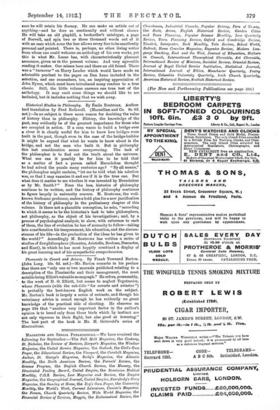Historical Studies in Philosophy. By Emile Boutroux. Author- ized translation
by Fred Rothwell. (Macmillan and Co. 8s. 6d. net.)—In no subject is there more reason for doubting the value of history than in philosophy. History, the knowledge of tho past, may evidently be of the greatest importance for those who are occupied in action. If a man wants to build a bridge over a river it is clearly useful for him to know how bridges were built in the past, though even in the case of the bridge-builder it might be argued that what he wants to know about is the bridge, and not the man who built it. But in philosophy this last consideration seems overpowering. The task of the philosopher is to find out the truth about the universe. What use can it possibly be for him to be told that as a matter of fact a person called Heracleitus thought he had solved the puzzle many centuries ago ? "By all means," the philosopher might exclaim, "let me be told what his solution was, so that I may examine it and see if it is the true one. But what does it matter to me 'whether it was invented by Heracleitus or by Mr. Smith ? " None the less, histories of philosophy continue to be written, and the history of philosophy continues to figure largely in university courses. M. Boutroux, the well- known Sorbonne professor, makes a bold plea for a new justification of the history of philosophy in the preliminary chapter of this volume. Is there not a plausible conception, he asks, "according to which it seems to be the historian's task to take philosophers, not philosophy, as the object of his investigations ; and, by a process of psychological analysis, to show, with reference to each of them, the lino of evolution he has of necessity to follow—taking into consideration his temperament, his education, and the circum- stances of his life—in the production of the ideas he has given to the world?" Accordingly M. Boutroux has written a series of studies of five philosophers (Socrates, Aristotle, Boehme, Descartes, and Kant), in which he has most happily combined a display of his great learning and of his sympathetic comprehension.






































 Previous page
Previous page